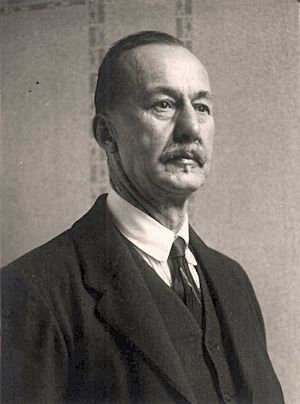Wilhelm Wirtinger facts for kids
Quick facts for kids
Wilhelm Wirtinger
|
|
|---|---|

Wilhelm Wirtinger
|
|
| Born | 19 July 1865 Ybbs an der Donau, Austrian Empire
|
| Died | 16 January 1945 (aged 79) Ybbs an der Donau, Greater German Reich
|
| Nationality | Austrian |
| Alma mater | University of Vienna |
| Known for | Complex analysis of one and several variables Wirtinger derivatives Wirtinger presentation Wirtinger's formula Wirtinger's inequality for functions Wirtinger's representation and projection theorem |
| Awards | Sylvester Medal (1907) |
| Scientific career | |
| Fields | Mathematics |
| Institutions | University of Innsbruck University of Vienna |
| Doctoral advisor | Emil Weyr Gustav Ritter von Escherich |
| Doctoral students | Wilhelm Blaschke Hilda Geiringer Kurt Gödel Wilhelm Gross Eduard Helly Leopold Vietoris Roland Weitzenböck |
Wilhelm Wirtinger (19 July 1865 – 16 January 1945) was an Austrian mathematician, working in complex analysis, geometry, algebra, number theory, Lie groups and knot theory.
Biography
He was born at Ybbs on the Danube and studied at the University of Vienna, where he received his doctorate in 1887, and his habilitation in 1890. Wirtinger was greatly influenced by Felix Klein with whom he studied at the University of Berlin and the University of Göttingen.
Honours
In 1907 the Royal Society of London awarded him the Sylvester Medal, for his contributions to the general theory of functions.
Work
Research activity
He worked in many areas of mathematics, publishing 71 works. His first significant work, published in 1896, was on theta functions. He proposed as a generalization of eigenvalues, the concept of the spectrum of an operator, in an 1897 paper; the concept was further extended by David Hilbert and now it forms the main object of investigation in the field of spectral theory. Wirtinger also contributed papers on complex analysis, geometry, algebra, number theory, and Lie groups. He collaborated with Kurt Reidemeister on knot theory, showing in 1905 how to compute the knot group. Also, he was one of the editors of the Analysis section of Klein's encyclopedia.
During a conversation, Wirtinger attracted the attention of Stanisław Zaremba to a particular boundary value problem, which later became known as the mixed boundary value problem.
Teaching activity
A partial list of his students includes the following scientists:
- Alfred Berger
- Wilhelm Blaschke
- Hilda Geiringer
- Kurt Gödel
- Wilhelm Gross
- Eduard Helly
- Hans Hornich
- Erwin Schrödinger
- Karl Strubecker
- Olga Taussky-Todd
- Leopold Vietoris
- Roland Weitzenböck
Selected publications
- , available at DigiZeitschirften. In this important paper, Wirtinger introduces several important concepts in the theory of functions of several complex variables, namely Wirtinger derivatives and the tangential Cauchy–Riemann condition. The paper is deliberately written from a formal point of view, i.e. without giving a rigorous derivation of the properties deduced.
- .
- .
See also
- Wirtinger inequality (2-forms)

